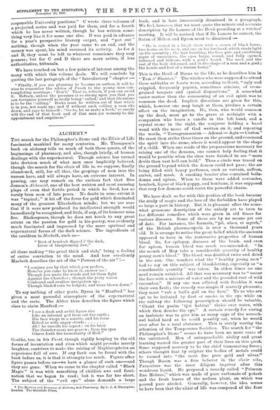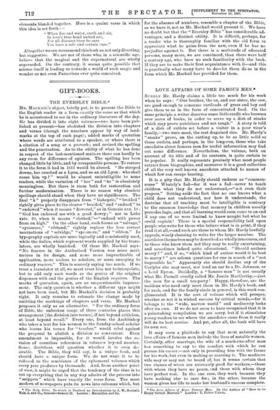ALCHEMY.*
• The Mystery and Romance of Alchemy and Pharmacy. By C. J. 0. Thompson. London The Scientific Press, THE search for the Philosopher's Stone and the Elixir of Life
fascinated mankind for many centuries. Mr. Thompson's book on alchemy tells us much of both these quests, of the beginnings of pharmacy, and also, though briefly, of human dealings with the supernatural. Though science has turned into derision much of what men once implicitly believed, though the search for the elixir of life is, we suppose, finally abandoned, still, for all that, the gropings of men into the unseen have, and will always have, an extreme interest. In passing, one may remark on the curious fact that Ben Jonson's Alchemist, one of the best written and most amusing plays of even that fertile period in which he lived, has so rarely been seen of late years. No doubt to some extent it was " topical; " it hit off the fever for gold which dominated many of the greatest Elizabethan minds ; but we are sure that if it were now produced its intellectual strength would immediately be recognised, and little, if any, of its humour miss fire. Shakespeare, though he does not touch to any great extent on the passion for gold in his poetry, was evidently much fascinated and impressed by the more spiritual and supernatural forms of the dark science. The ingredients of the cauldron in Macbeth, such as-
" Root of hemlock digged i' the dark, Liver of blaspheming Jew,"
all these making " the gruel thick and slab," bring a feeling of entire conviction to the mind. And how excellently Macbeth describes the art of the "Powers of the air " !—
" I conjure you by that which you profess, Howe'er you came to know it, answer me ! Though you untie the winds and let them fight Against the Churches ; though the yesty waves Confound and swallow navigation up ;
Though bladed corn be lodged ; and trees blown down."
To say nothing of other poets, Byron in " Manfred " has given a most powerful atmosphere of the supernatural and the eerie. The Abbot thus describes the figure which rises to claim Manfred :—
"I see a dusk and awful figure rise
Like an infernal god from out the earth ; His face wrapt in a mantle, and his form
Robed as with angry clouds ; Ah ! he unveils his aspect : on his brow The thunder-scars are graven; from his eyes Glares forth the immortality of Hell."
Goethe, too, in his Faust, though rigidly keeping to the old forms of incantation and rites which might provoke merely laughter, contrives to make the raising of Mephistopheles an experience full of awe. If any fault can be found with the book before us, it is that it attempts too much. Figure after figure passes before us—we have a glance of each one—and they are gone. When we came to the chapter called "Black Magic" it was with something of childish awe and fasci- nation that we began to read ; but it was far too short. The subject of the "evil eye" alone demands a large
book, and is here irreverently dismissed in a paragraph. We feel, however, that we must quote the minute and accurate description by De Lanore of the Devil presiding at a witches' meeting. It will be noticed that if De Lanore be correct, the Satan of Milton and Byron must be dismissed " Ho is seated in a black chair with a crown of black horns, two horns on his neck, and one on his forehead, which sheds light on the assembly ; the hair bristling, the face pale and exhibiting signs of uneasiness, the eyes large, round, and fully opened, inflamed and hideous, with a goat's board. The neck and the rest of the body deformed, and in the shape of a man and a goat ; the hands and feet of a human being."
This is the Devil of Burns to the life, as he describes him in
" Tam o' Shanter." The witches who were supposed to attend these sabbaths or feasts were, according to Scott, "ugly and crippled, frequently papists, sometimes atheists, of cross- grained tempers and cynical dispositions." A somewhat easier matter than the summoning of an evil spirit was to
summon the dead. Implicit directions are given for this, which, however one may laugh at them, produce a certain effect on the imagination. He, then, who would summon up the dead, must go to the grave at midnight with a companion who bears a candle in the left hand, and a crystal stone in the right, the conjuror holding a hazel wand with the name of God written on it, and repeating the words, " Terragrammaton — Adonai — Agla — Craton." He must then strike three times on the ground, and command the spirit into the stone, where it would appear in the shape of a child. When one reads of the preparations necessary for raising one of the demons, one cannot help feeling that it would be possible when the rites were finished to see " more devils than vast hell can hold." Thus a circle was traced on the ground beyond which the demon could not pass ; the air being filled with heavy perfumes, such as vervain, saffron, amber, and musk. A smoking brazier also contained bella- donna and opium. When to these were added coriander, hemlock, liquor of black poppy, and hen bane, it was supposed that very few demons could resist the powerful charm.
We have dealt so far with this portion of the book because the study of magic and the love of the forbidden have played so large a part in history. But it is pleasant after the some- what gruesome description of the unholy art to turn to the different remedies which were given in old times for various diseases. Some of these are by no means yet out of date. For instance, the formula, " pil, aloes, et myrrh," of the British pharmacopteia is over a thousand years old. It is strange to notice the great belief which the ancients
appeared to have in the restorative properties of human blood. So, for epilepsy, diseases of the brain, and even for spleen, human blood was much recommended. "In the month of May take a considerable quantity of healthy young men's blood." The blood was distilled twice and dried
in the sun. One wonders what the " healthy young men " had to say on this subject of blood-letting, especially as "a considerable quantity" was taken. In olden times no one
need remain wrinkled. All that was necessary was to " smear the face with a mixture of water and the pounded root of wild cucumber." If any one was afflicted with freckles it was their own fault ; the remedy was simple if scarcely pleasant;
they must " rub a bull's gall on the face." To us who are
apt to be irritated by dust or smoke in the eye while on the railway the following prescription should be valuable,
" Chant the psalm Qui habitat' thrice over water, with which then douche the eye." A certain remedy for curing an inebriate was to give him as many eggs of the screech- owl boiled hard as he could possibly eat, when he would ever after be a total abstainer. This is surely worthy the attention of the Temperance Societies. The search for " the Philosopher's Stone" seems to have been no mere craze of the unlettered. Men of unimpeachable ability and great learning wasted the greater part of their lives on this quest. Some supposed mercury to be the chief transmuting force ; others thought that by sulphur the bodies of metals could be turned into " the most fine pure gold and silver." Though Bacon was a firm believer in the elixir vine, Paracelsns was the most diligent inquirer after this wondrous liquid. He prepared a remedy called " Primnm Ens Melissa," which was made of pure carbonate of potash and the fresh leaves of the melissa plant, on which was poured pure alcohol. Generally, however, the idea seems to have been that the elixir of life was composed of the four elements blended together. Here is a quaint verse in which this idea is set forth When fire and water, earth and air, In love's true bond united are, For all diseases then be sure You have a safe and certain cure."
Altogether we can recommend this book as not only diverting, but suggestive. We are not of those who, in a scientific age, believe that the magical and the supernatural are wholly superseded. On the contrary, it seems quite possible that science itself is leading us towards a world of such magic and wonder as not even Paracelsus ever quite conceived.























































 Previous page
Previous page